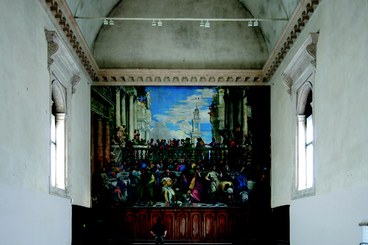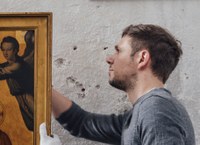Carlos Bayod Lucini (Project Director at Factum Foundation) - Surface 3D Scanning and Facsimiles for Cultural Heritage Preservation
This seminar is held within the Laboratory activity for DHDK. It will explore the potential of digital technology, in particular close-range 3D scanning.

-
Date: 31 MARCH 2021 from 16:00 to 18:00
-
Event location: TEAMS meeting
-
Type: Seminars

The seminar
This seminar will explore the potential of digital technology, in particular close-range 3D scanning, to contribute to the conservation, study and dissemination of art and cultural elements. For more than a decade, the Factum Foundation has developed and applied high-resolution recording systems for the documentation of originals artifacts. The obtained data, apart from being an invaluable source of information for understanding the complex historic trajectories of the objects, can be used for the creation of facsimiles. A facsimile is an exact replica made to help to the preservation of the original. From an experimental approach and thanks to a creative combination of digital technology with traditional craft skills, the Factum Foundation has realized facsimiles of some of the main cultural elements at a global level: from the Tomb of Tutankhamun to the Polittico Griffoni, to name two examples. The role of facsimiles will be explored in the context of the moment of uncertainty we live in, analising the relation between originality and authenticity, physicality and virtuality, protection and dissemination. A series of case studies will be presented, to help understand the real challenges of digital technology as a tool for cultural mediation in today's changing world.
The Speaker
Carlos Bayod Lucini is Project Director at Factum Foundation. His work is dedicated to the development and application of digital technology to the preservation of Art and Cultural Heritage. With the Lucida 3D Scanner, he has digitized more than 200 paintings and low-relief objects in collaboration with museums around the world. He started and taught the Preservation Technology Studio at Columbia University’s Historic Preservation Program and has lectured extensively worldwide. Carlos received an MS in Architecture from the Technical University of Madrid and is a PhD candidate at the Department of Art Theory and History at the Autonomous University of Madrid.
Factum Foundation
Factum Foundation was established in 2009 by Adam Lowe to demonstrate the importance of documenting, monitoring, studying, re-creating and disseminating the world’s cultural heritage through the rigorous development of high-resolution recording and re-materialisation techniques. Factum Foundation has a proven track record in the recording of heritage – both cultural and climate-related – and in the preservation of architectural masterpieces through putting them to new uses (such as Factum’s ARCHiVe project – the Analysis and Recording of Cultural Heritage in Venice, the Theban Necropolis Preservation Initiative in the Valley of the Kings in Luxor and the work with the Kuikuro and Wauja communities in the Upper Xingu). Over the past four years the Foundation has been working with Re-Form Heritage to prevent the permanent loss of the Whitechapel Bell Foundry in London.